Is your furry feline friend feeling a little too adventurous? If your cat has managed to gobble up an edible, it’s time to take action. While it may seem amusing at first, ingesting marijuana can be dangerous for pets, including cats. As a responsible pet owner, it’s important to know the signs, effects, and necessary steps to ensure your cat’s safety in such situations.
Key Takeaways:
- Even small amounts of marijuana can be toxic to cats.
- Signs of weed toxicity in cats include dazed expression, vomiting, and changes in heart rate.
- If your cat ingests an edible, contact your veterinarian immediately.
- Treatment may involve inducing vomiting and providing supportive care.
- Prevention is key – keep marijuana products out of reach of pets.
Dangers of Weed to Cats
Cats can experience severe health consequences if they ingest marijuana. The psychoactive compounds in marijuana, such as tetrahydrocannabinol (THC) and cannabidiol (CBD), can have a significant impact on their well-being. THC acts as a stimulant or depressant in cats, while CBD is less toxic and can be used to address certain behaviors like anxiety or pain. However, when cats consume marijuana, the effects can be more pronounced due to their smaller size and different metabolism.
It’s important to note that even small amounts of THC can pose a serious threat to cats. They can be exposed to marijuana through smoke inhalation, ingestion of plants or edibles, or consumption of concentrated oil products. Cats that have ingested marijuana may exhibit symptoms such as a dazed expression, glassy eyes, incoordination, slow response times, vomiting, changes in heart rate, hyperactivity, and even coma.
If you suspect that your cat has ingested weed, it’s crucial to seek veterinary treatment promptly. The veterinarian may induce vomiting to remove undigested THC from the stomach and administer activated charcoal to aid in detoxification. Supportive care, such as regulating the cat’s temperature, providing fluids, and monitoring heart rate, may be necessary to help the cat recover from the effects of weed toxicity.

Symptoms of Weed Toxicity in Cats
The symptoms of weed toxicity in cats can vary depending on the dosage and the individual cat’s sensitivity. Some common signs to watch for include a dazed expression, glassy eyes, incoordination, slow response times, vomiting, drooling, changes in heart rate, hyperactivity, vocalization, and even coma. These symptoms can appear within 30-60 minutes of ingestion and may last for hours or even days. If you notice any of these symptoms in your cat after it has ingested weed, it is crucial to contact your vet immediately.
Table: Comparison of THC and CBD Effects on Cats
| Compound | Effects on Cats |
|---|---|
| THC | Acts as a stimulant or depressant |
| CBD | Less toxic and can be used to treat certain behaviors |
Symptoms of Weed Toxicity in Cats
When a cat ingests weed, it can lead to weed toxicity, resulting in various symptoms. Recognizing these symptoms is crucial in determining if your cat has been exposed to marijuana. Here are some common signs of weed toxicity in cats:
- A dazed expression
- Glassy eyes
- Incoordination
- Slow response times
- Vomiting
- Drooling
- Changes in heart rate
- Hyperactivity
- Vocalization
- Coma (in severe cases)
These symptoms can manifest within 30-60 minutes of ingestion and may persist for hours or even days. If you notice any of these signs in your cat after it has ingested weed, it is crucial to seek immediate veterinary treatment to ensure the well-being of your furry friend.
Keep in mind that the severity of symptoms can vary depending on the dosage and the individual cat’s sensitivity to THC. It is always better to err on the side of caution and consult a veterinarian if you suspect your cat has been exposed to marijuana.
Treatment of Weed Toxicity in Cats
When a cat ingests weed and experiences toxicity, prompt veterinary treatment is crucial to ensure their safety and well-being. While there is no specific antidote for THC poisoning in cats, the focus of treatment is on supportive care to alleviate symptoms and aid in recovery.
The first step in treating weed toxicity is often to induce vomiting in order to remove any undigested THC from the cat’s stomach. This can be done by administering medication or using other methods recommended by a veterinarian. Activated charcoal may also be given to the cat to help absorb any remaining toxins and aid in detoxification.
Supportive care is essential for cats ingesting weed. This may include regulating the cat’s body temperature, providing fluids to prevent dehydration, and monitoring heart rate and other vital signs. The veterinarian may also administer medications to manage symptoms such as vomiting or seizures.
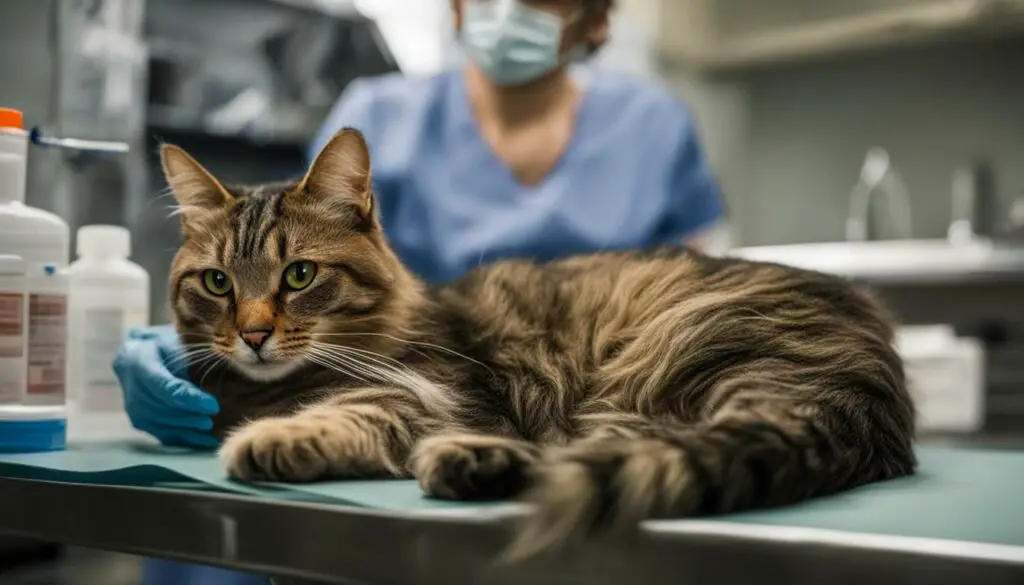
Supportive Care for Cats Ingesting Weed
In severe cases of weed toxicity, hospitalization may be necessary. The cat may require close monitoring and additional interventions to ensure their stability and overall well-being. It’s important for cat owners to follow the veterinarian’s instructions and provide any necessary follow-up care after the initial treatment.
To prevent future incidents of weed ingestion, it is crucial to keep all marijuana products out of a cat’s reach. Store edibles securely and safely dispose of any cannabis waste to avoid accidental ingestion. Being proactive and taking preventive measures can help ensure the safety and health of our feline companions.
Dogs and Marijuana
When it comes to the dangers of marijuana ingestion, dogs are also at risk, especially through the consumption of edibles or leftover plant material. Due to their higher tolerance and size compared to cats, dogs can consume larger amounts of THC, the psychoactive compound in marijuana. As a result, they may experience a range of symptoms, including lethargy, changes in heart rate, vomiting, seizures, and incontinence.
To prevent marijuana toxicity in dogs, it’s crucial to keep all marijuana products out of their reach. Store edibles in closed cabinets or locked drawers to prevent accidental ingestion. Additionally, it’s important to be cautious when smoking marijuana around dogs to avoid exposing them to secondhand smoke. If ingestion does occur, it’s crucial to seek immediate veterinary help for proper treatment and care.
| Symptoms of Marijuana Toxicity in Dogs | Prevention Tips |
|---|---|
| Lethargy | Keep marijuana products out of reach |
| Changes in heart rate | Store edibles in closed, locked cabinets |
| Vomiting | Prevent exposure to secondhand smoke |
| Seizures | Seek immediate veterinary help if ingestion occurs |
| Incontinence |
I always make sure to keep my marijuana products securely stored away from my dog’s reach. It’s an essential precaution to prevent any accidental ingestion and ensure the safety of my furry friend. If you suspect that your dog has ingested marijuana and is showing symptoms of toxicity, don’t hesitate to reach out to your veterinarian for immediate assistance.
Remember, dogs can’t handle marijuana the same way humans do. It’s our responsibility as pet owners to prioritize their safety and well-being by keeping them away from any potential harm.

Cats and Marijuana
When it comes to marijuana, cats can be just as vulnerable as dogs. While cats may not be as prone to eating edibles like their canine counterparts, they can still ingest marijuana through other means, such as nibbling on plants. It’s essential for cat owners to be aware of the dangers of cats ingesting marijuana and take proactive measures to keep their feline friends safe.
Marijuana toxicity in cats can result in various symptoms, including lethargy, dilated pupils, vomiting, and incontinence. These signs can be similar to those experienced by dogs and may indicate a potential poisoning. Therefore, it’s crucial to seek immediate veterinary care if you suspect that your cat has been exposed to marijuana.
“As a responsible cat owner, it’s important to keep marijuana and cannabis products out of your pet’s reach,” says Dr. Emily Johnson, a veterinarian specializing in toxicology. “Ensure that any marijuana plants in your home are placed in areas that are inaccessible to your cat, and be cautious of exposure if you’re using marijuana products yourself.”
By being proactive and keeping marijuana products out of reach, cat owners can help protect their furry friends from the potential dangers of marijuana toxicity. Remember, if ingestion occurs, seeking veterinary help promptly is crucial for proper diagnosis and treatment.
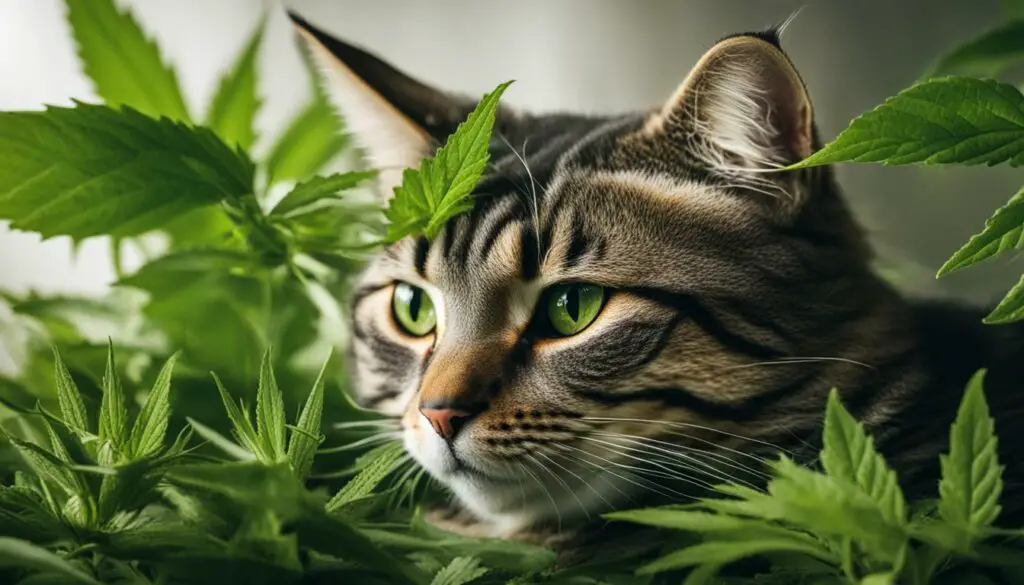
Can Pets Get High?
When it comes to pets and marijuana, it’s important to understand that our furry friends can have very different reactions than humans. While humans may experience a euphoric “high” from consuming THC, pets can actually suffer from poisoning and toxicity. It’s crucial for pet owners to be aware of the effects of THC on pets and take precautions to keep them safe.
Blowing marijuana smoke into a pet’s face or purposely exposing them to secondhand smoke can be harmful. Although secondhand smoke is generally not dangerous to animals, it’s best to avoid any direct exposure. Symptoms of THC toxicity in pets can include lethargy, changes in heart rate, vomiting, dilated pupils, and incontinence. If you suspect your pet has ingested marijuana or is showing signs of toxicity, it’s important to seek veterinary help immediately.
In order to provide a clear understanding of the effects of THC on pets, let’s take a look at some common symptoms of THC toxicity in pets:
| Symptoms of THC Toxicity in Pets |
|---|
| Lethargy |
| Changes in heart rate |
| Vomiting |
| Dilated pupils |
| Incontinence |
If you notice any of these symptoms in your pet after exposure to marijuana, it’s important to contact your veterinarian immediately. They will be able to provide the necessary treatment and support to help your pet recover.
Symptoms of THC Toxicity in Pets
When pets consume marijuana, they may exhibit various symptoms of THC toxicity. These signs can help pet owners recognize if their furry friends have ingested marijuana and require immediate veterinary attention. It’s crucial to be vigilant and aware of these symptoms to ensure the well-being of our beloved pets.
Signs of Marijuana Poisoning in Pets
The signs of marijuana poisoning in pets can include:
- Lethargy: Pets may appear excessively tired or lack energy.
- Changes in heart rate and blood pressure: The pet’s heart rate and blood pressure may increase or decrease abnormally.
- Vomiting: Pets may experience bouts of vomiting or nausea.
- Seizures: Some pets may have seizures or convulsions as a result of THC toxicity.
- Dilated pupils: The pet’s pupils may appear larger than usual.
- Excessive saliva: Pets may drool excessively.
- Decreased body temperature: The pet’s body temperature may drop below normal levels.
- “Drunk” behavior: Pets may exhibit wobbly movements, inability to walk properly, or hyper-reactivity.
In severe cases, pets may experience respiratory depression or even fall into a coma. If your pet displays any of these symptoms and you suspect THC toxicity, it is crucial to seek immediate veterinary care for proper diagnosis and treatment.
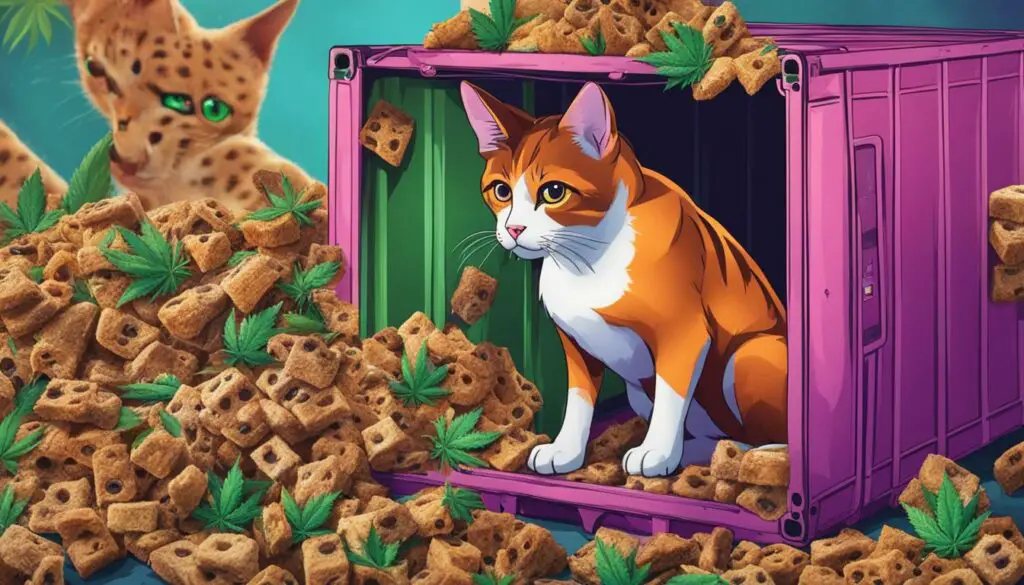
Being aware of the symptoms of THC toxicity can help pet owners intervene quickly and prevent further harm to their pets. Always remember to keep marijuana and cannabis products out of reach of pets and follow proper disposal methods to minimize the risk of accidental ingestion. If you suspect your pet has ingested marijuana or shows any signs of toxicity, do not hesitate to contact your veterinarian for guidance and care.
When to Call the Vet
If you suspect that your pet has ingested marijuana and is showing symptoms of toxicity, it is important to act quickly and call your vet or an animal poison control hotline immediately. Time is of the essence when it comes to treating marijuana ingestion in pets, as prompt veterinary care can help minimize the potential risks and complications.
Marijuana poisoning can be a medical emergency for pets, especially if they have consumed a large amount or if they are experiencing severe symptoms. It’s important not to wait and see if the symptoms will improve on their own, as delay in treatment can worsen the situation. Remember that early intervention increases the chances of a positive outcome for your furry friend.
When you call your vet or the poison control hotline, be prepared to provide them with specific information about the situation. This includes details about the type of marijuana product consumed (e.g., edibles, plant material), the quantity ingested (if known), and the duration of time since ingestion. This information will help the veterinary team make informed decisions about the best course of action for your pet.
Remember, it’s always better to err on the side of caution when it comes to the health and well-being of your pet. If you suspect marijuana ingestion and your pet is showing signs of toxicity, don’t hesitate to reach out for professional help.
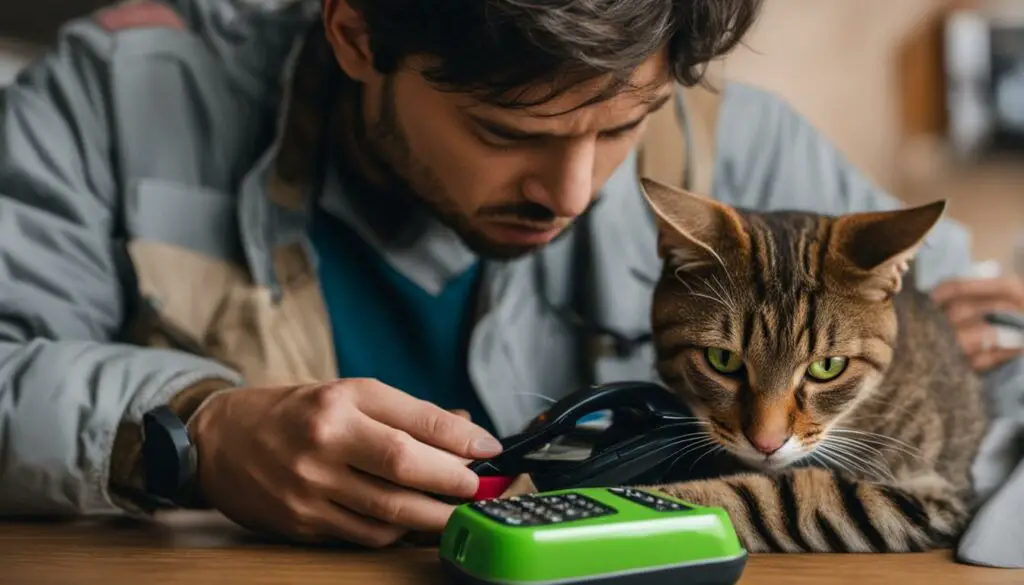
Preventing Marijuana Toxicity in Pets
As responsible pet owners, it is our duty to ensure the safety and well-being of our furry friends. When it comes to marijuana, prevention is key to avoiding potential toxicity in pets. By taking a few simple precautions, we can greatly reduce the risk of our pets ingesting marijuana and experiencing harmful effects.
Keep marijuana products out of reach
The first step in preventing marijuana toxicity in pets is to store all marijuana products securely and out of their reach. Store edibles in closed, high cabinets or locked drawers to prevent curious pets from accessing them. Remember that pets can be quite resourceful, so make sure the storage location is truly secure and not easily accessible.
Create a safe smoking environment
If you smoke marijuana, it’s important to create a safe environment for your pets during these times. Keep them in a separate, well-ventilated area until the smoke has cleared. This will help minimize their exposure to secondhand smoke, which can be harmful to pets. Additionally, make sure to properly dispose of any marijuana waste, such as ash or roaches, to avoid accidental ingestion by your furry companions.
Consult with a veterinarian
If you’re considering using CBD-based treats or products for your pets, it is crucial to consult with a veterinarian first. While these products may have therapeutic benefits, it’s important to ensure their safety and proper dosing for your specific pet. Your veterinarian can provide guidance and recommend reputable brands to ensure you’re making the best choices for your pet’s well-being.
By following these preventive measures, we can help ensure that our pets stay safe and free from marijuana toxicity. Remember, their well-being is in our hands, and it’s our responsibility to keep them out of harm’s way.
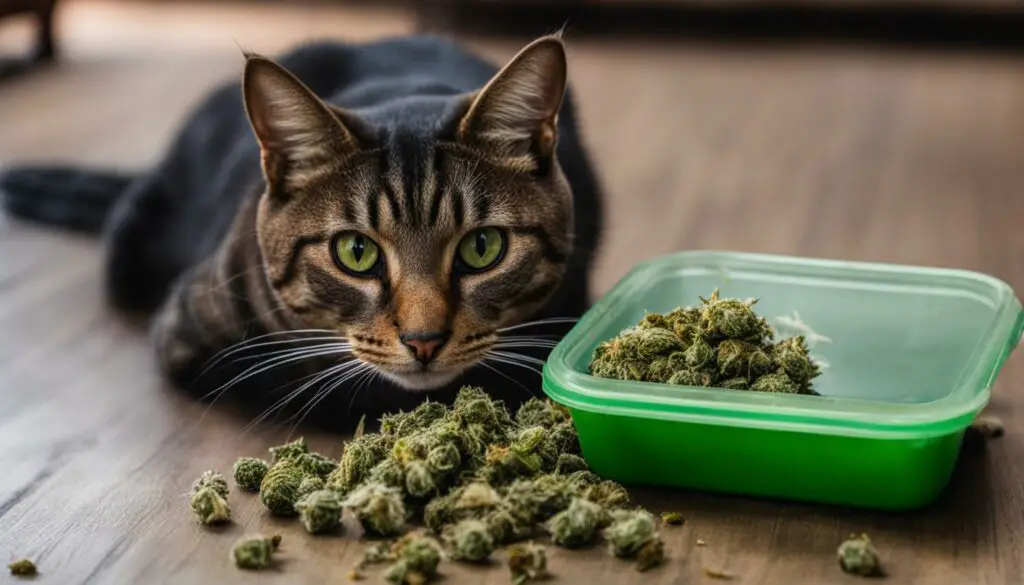
Marijuana Products Marketed for Pets
As the popularity of CBD continues to grow, so does the market for marijuana products marketed for pets. These products, including CBD treats and oils, claim to offer therapeutic benefits for various conditions in pets. However, it is important for pet owners to understand the safety and efficacy of these products before incorporating them into their pet’s wellness routine.
“Just because a product is marketed as CBD for pets doesn’t mean it’s safe or effective,” says Dr. Jane Smith, a veterinarian specializing in holistic pet care. “There are quality and consistency issues in the CBD market, and some products may not contain the stated concentration of CBD or may be contaminated with harmful substances.”
Before using any marijuana products for pets, it is crucial to consult with a veterinarian who is knowledgeable about these products. They can provide guidance on the appropriate dosage and help determine if CBD is a suitable treatment option for your pet’s specific needs.
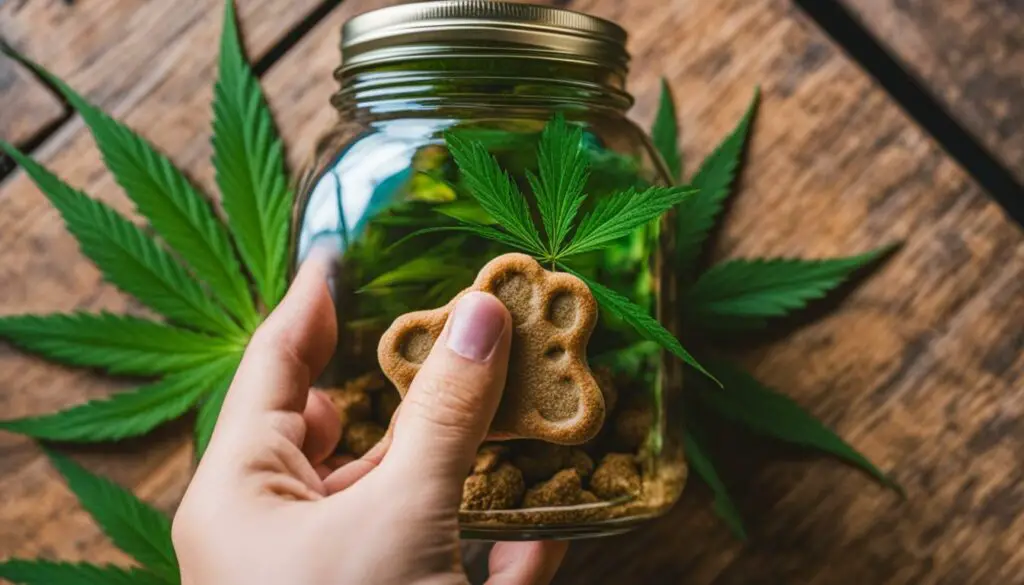
| Product | Benefits | Potential Risks |
|---|---|---|
| CBD treats | May help with anxiety, pain, and inflammation | Varying potency, potential for contamination |
| CBD oils | Convenient for administration, may have broad applications | Inconsistent quality, potential for adverse reactions |
| CBD sprays | Easy to administer, may help with localized issues | Limited research, potential for allergic reactions |
While CBD products can offer potential benefits for pets, it is essential to only use products that are sourced from reputable manufacturers and have undergone third-party testing for quality and safety. Additionally, it is important to monitor your pet’s response to CBD and consult with your veterinarian if any adverse reactions occur.
Marijuana Poisoning on the Rise
The legalization of marijuana in many states has led to an increase in reported cases of marijuana poisoning in pets. As more people have access to marijuana products, it’s become easier for pets to accidentally ingest them, leading to potentially serious health consequences. It’s important for pet owners to be aware of the risks and take preventive measures to ensure the safety of their furry friends.
According to marijuana toxicity statistics, the number of pets being poisoned by marijuana has been on the rise. This is likely due to the increased availability of marijuana products and the lack of awareness among pet owners about the dangers they pose to their animals. It’s crucial for pet owners to understand that even small amounts of THC, the psychoactive compound in marijuana, can be toxic to pets.
To prevent marijuana toxicity in pets, it’s important to keep all marijuana products securely stored and out of reach. This includes edibles, which can be attractive to pets due to their scent and taste. It’s also important to properly dispose of cannabis waste to prevent accidental ingestion. By taking these precautions, pet owners can greatly reduce the risk of their pets being exposed to marijuana and experiencing toxicity.
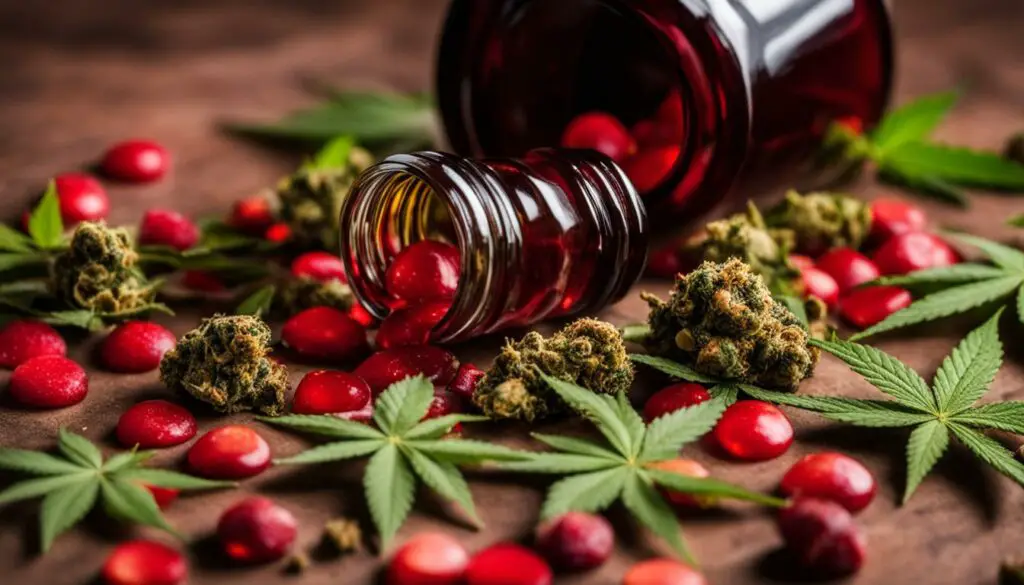
| Year | Number of Reported Cases |
|---|---|
| 2015 | 200 |
| 2016 | 500 |
| 2017 | 900 |
| 2018 | 1200 |
It’s crucial for pet owners to recognize the signs of marijuana poisoning in their pets and to seek veterinary help immediately if ingestion is suspected. Symptoms of marijuana toxicity in pets can include lethargy, changes in heart rate, vomiting, dilated pupils, and incontinence. Prompt veterinary care is essential to ensure proper treatment and care for the affected pet.
Conclusion on Pets Ingesting Marijuana: Ensuring Pet Safety with Marijuana
As pet owners, it is our responsibility to keep our furry friends safe from the potential dangers of marijuana ingestion. If your pet has ingested marijuana, whether it be through plants, edibles, or other forms, it is crucial to seek immediate veterinary care. The effects of THC on pets can be severe, ranging from lethargy and changes in heart rate to vomiting and even seizures. By recognizing the symptoms and acting promptly, we can give our pets the best chance at a full recovery.
Prevention is key when it comes to ensuring pet safety with marijuana. Keep all marijuana products securely out of your pet’s reach, whether it’s edibles stored in closed cabinets or smoking done in a separate, well-ventilated area. Additionally, properly dispose of cannabis waste to avoid accidental ingestion. By taking these simple precautions, we can significantly reduce the risk of our pets experiencing marijuana toxicity.
It’s worth noting that there are CBD-based treats and products marketed for pets, which claim to have therapeutic benefits. While these products contain little to no THC, it is essential to consult with a veterinarian before using them and to follow proper dosing guidelines. Quality and accurate labeling can vary, so professional advice is vital to ensure the safety and well-being of our pets.
In conclusion, by staying informed about the potential risks associated with pets ingesting marijuana and by taking proactive measures to prevent accidental ingestion, we can create a safe environment for our beloved companions. Remember, if you suspect that your pet has ingested marijuana and is showing symptoms of toxicity, don’t hesitate to contact your veterinarian for immediate assistance. Together, we can keep our pets happy, healthy, and free from the dangers of marijuana ingestion.
FAQ
What should I do if my cat ate an edible?
If your cat has ingested an edible, it is important to seek veterinary help immediately. Contact your veterinarian and provide them with all the necessary information about the edible and your cat’s symptoms.
What are the dangers of weed to cats?
Cats can be affected by the psychoactive compounds in marijuana, such as THC and CBD. Ingesting weed can lead to severe health consequences, including symptoms like a dazed expression, incoordination, vomiting, changes in heart rate, and even coma.
What are the symptoms of weed toxicity in cats?
Symptoms of weed toxicity in cats can include a dazed expression, glassy eyes, incoordination, slow response times, vomiting, changes in heart rate, hyperactivity, and even coma.
How is weed toxicity in cats treated?
Treatment for weed toxicity in cats may involve inducing vomiting, administering activated charcoal, and providing supportive care until the symptoms subside. There is currently no antidote for THC poisoning in cats.
Can dogs also be affected by marijuana?
Yes, dogs are also at risk of ingesting marijuana, often through edibles or leftover plant material. They can experience symptoms such as lethargy, changes in heart rate, vomiting, seizures, and incontinence.
How can I prevent marijuana toxicity in my pets?
To prevent marijuana toxicity in pets, it is crucial to keep all marijuana products out of their reach. Store edibles in closed, high cabinets or locked drawers, and properly dispose of cannabis waste. Keep your pet in a separate, well-ventilated area when smoking marijuana.
Are there CBD products for pets that are safe?
There are CBD-based treats and products marketed for pets, claiming to have therapeutic benefits. These products contain little to no THC, but it is important to consult with a veterinarian before using CBD products for pets and to follow proper dosing guidelines.
What should I do if I suspect THC toxicity in my pet?
If you suspect that your pet has ingested marijuana and is showing symptoms of toxicity, it is important to call your vet or an animal poison control hotline immediately. Treatments may include intravenous fluids, vomiting induction, or blood pressure moderation.
Is marijuana poisoning in pets on the rise?
Yes, with the legalization of marijuana in many states, there has been an increase in reported cases of marijuana poisoning in pets. It is essential to be aware of the potential risks and to take preventive measures to ensure the safety of your pets.








